Reflection on Nursing Values: Bioethics and Legal Practice - RCSI
VerifiedAdded on 2023/04/21
|9
|2324
|72
Essay
AI Summary
This essay reflects on the importance of bioethics and laws in healthcare, particularly within nursing practice. It discusses key bioethical principles such as autonomy, dignity, justice, beneficence, non-maleficence, privacy, and confidentiality, referencing the Nursing and Midwifery Board of Ireland (NMBI) codes of ethics. The reflection is supported by two case scenarios encountered during a placement. The first scenario highlights the importance of respecting patient autonomy and dignity, while the second addresses the principle of patient confidentiality. The essay concludes by emphasizing the necessity for nurses to adhere to ethical principles to ensure patient safety, quality care, and to avoid legal repercussions, ultimately enhancing patient satisfaction. The essay underscores the role of ethical codes in guiding nurses through complex decision-making processes.
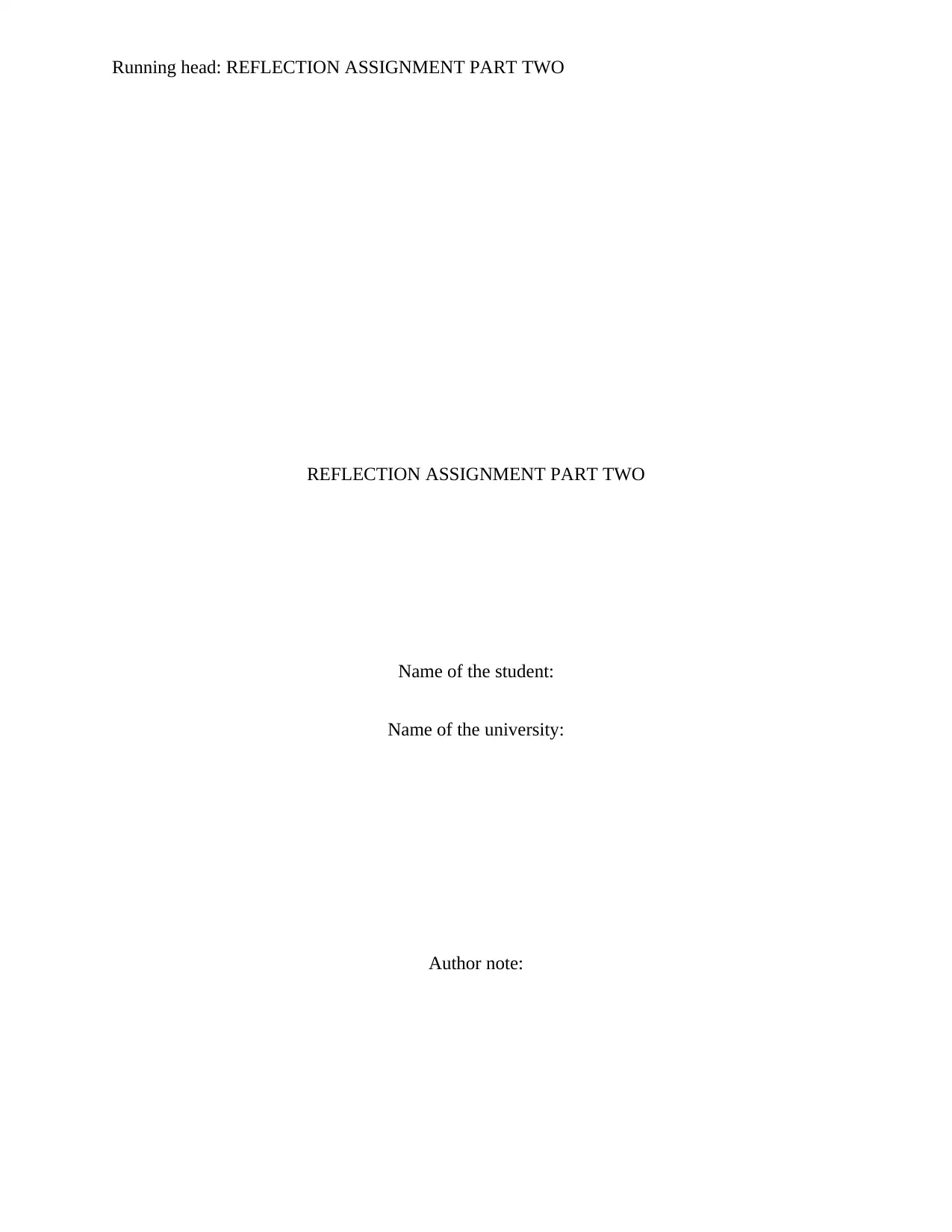
Running head: REFLECTION ASSIGNMENT PART TWO
REFLECTION ASSIGNMENT PART TWO
Name of the student:
Name of the university:
Author note:
REFLECTION ASSIGNMENT PART TWO
Name of the student:
Name of the university:
Author note:
Paraphrase This Document
Need a fresh take? Get an instant paraphrase of this document with our AI Paraphraser
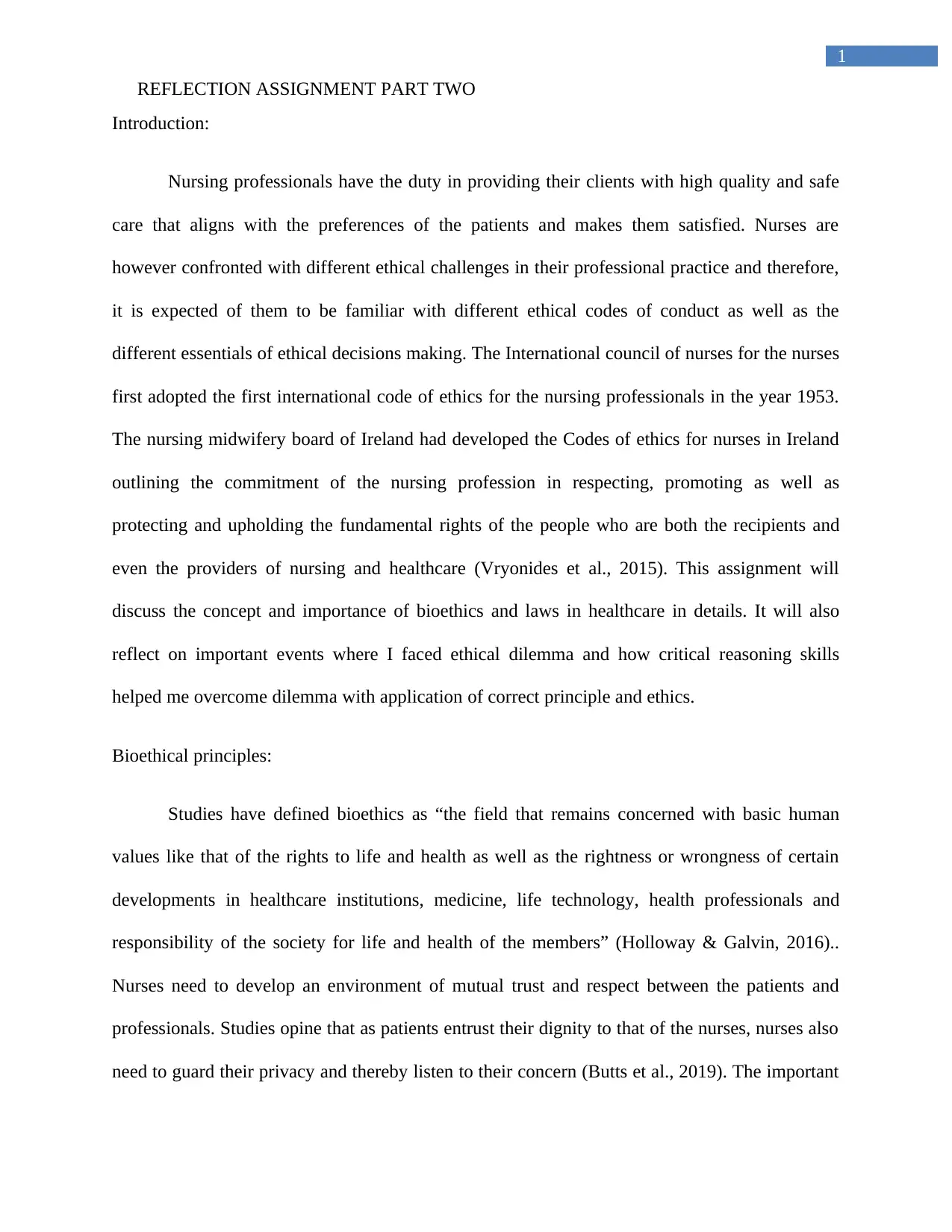
1
REFLECTION ASSIGNMENT PART TWO
Introduction:
Nursing professionals have the duty in providing their clients with high quality and safe
care that aligns with the preferences of the patients and makes them satisfied. Nurses are
however confronted with different ethical challenges in their professional practice and therefore,
it is expected of them to be familiar with different ethical codes of conduct as well as the
different essentials of ethical decisions making. The International council of nurses for the nurses
first adopted the first international code of ethics for the nursing professionals in the year 1953.
The nursing midwifery board of Ireland had developed the Codes of ethics for nurses in Ireland
outlining the commitment of the nursing profession in respecting, promoting as well as
protecting and upholding the fundamental rights of the people who are both the recipients and
even the providers of nursing and healthcare (Vryonides et al., 2015). This assignment will
discuss the concept and importance of bioethics and laws in healthcare in details. It will also
reflect on important events where I faced ethical dilemma and how critical reasoning skills
helped me overcome dilemma with application of correct principle and ethics.
Bioethical principles:
Studies have defined bioethics as “the field that remains concerned with basic human
values like that of the rights to life and health as well as the rightness or wrongness of certain
developments in healthcare institutions, medicine, life technology, health professionals and
responsibility of the society for life and health of the members” (Holloway & Galvin, 2016)..
Nurses need to develop an environment of mutual trust and respect between the patients and
professionals. Studies opine that as patients entrust their dignity to that of the nurses, nurses also
need to guard their privacy and thereby listen to their concern (Butts et al., 2019). The important
REFLECTION ASSIGNMENT PART TWO
Introduction:
Nursing professionals have the duty in providing their clients with high quality and safe
care that aligns with the preferences of the patients and makes them satisfied. Nurses are
however confronted with different ethical challenges in their professional practice and therefore,
it is expected of them to be familiar with different ethical codes of conduct as well as the
different essentials of ethical decisions making. The International council of nurses for the nurses
first adopted the first international code of ethics for the nursing professionals in the year 1953.
The nursing midwifery board of Ireland had developed the Codes of ethics for nurses in Ireland
outlining the commitment of the nursing profession in respecting, promoting as well as
protecting and upholding the fundamental rights of the people who are both the recipients and
even the providers of nursing and healthcare (Vryonides et al., 2015). This assignment will
discuss the concept and importance of bioethics and laws in healthcare in details. It will also
reflect on important events where I faced ethical dilemma and how critical reasoning skills
helped me overcome dilemma with application of correct principle and ethics.
Bioethical principles:
Studies have defined bioethics as “the field that remains concerned with basic human
values like that of the rights to life and health as well as the rightness or wrongness of certain
developments in healthcare institutions, medicine, life technology, health professionals and
responsibility of the society for life and health of the members” (Holloway & Galvin, 2016)..
Nurses need to develop an environment of mutual trust and respect between the patients and
professionals. Studies opine that as patients entrust their dignity to that of the nurses, nurses also
need to guard their privacy and thereby listen to their concern (Butts et al., 2019). The important
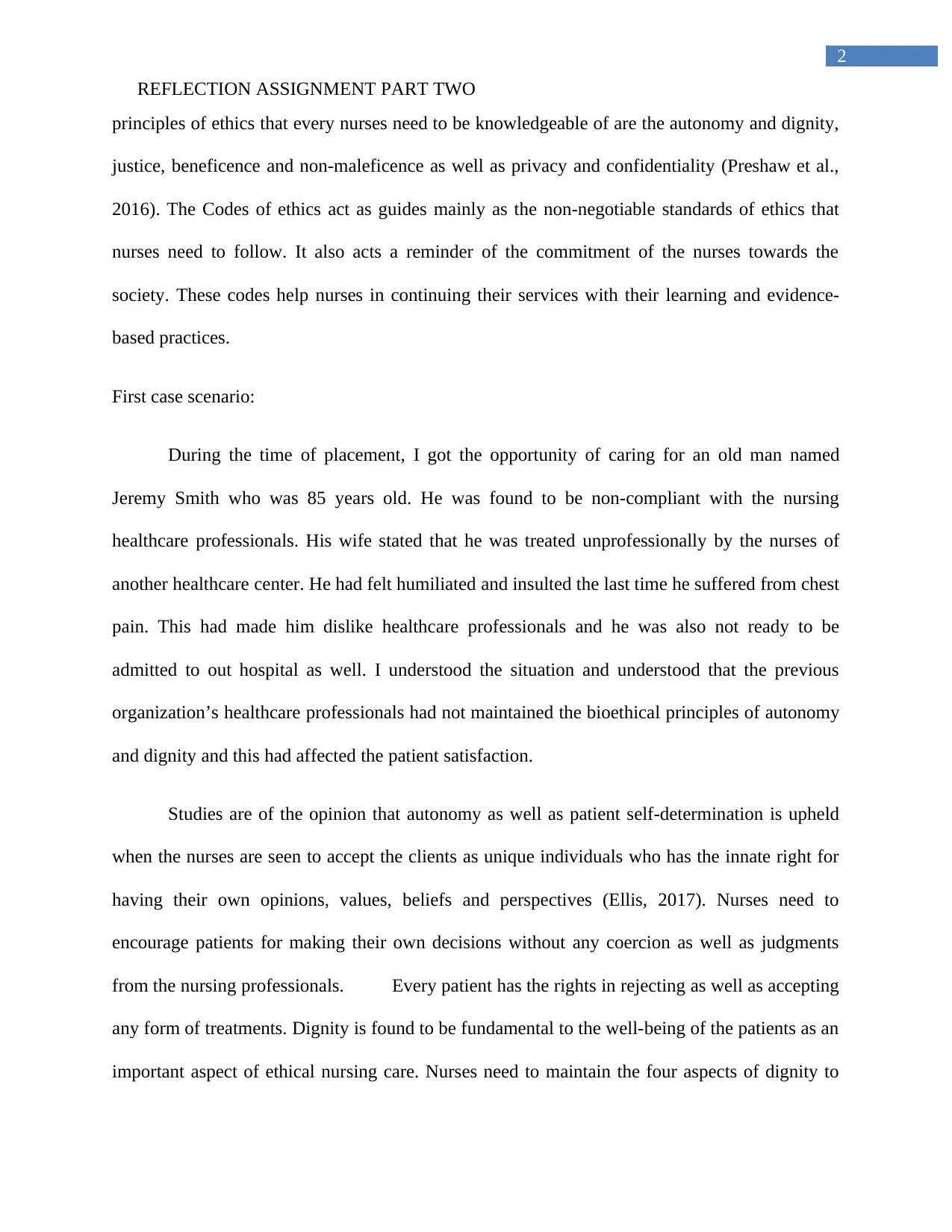
2
REFLECTION ASSIGNMENT PART TWO
principles of ethics that every nurses need to be knowledgeable of are the autonomy and dignity,
justice, beneficence and non-maleficence as well as privacy and confidentiality (Preshaw et al.,
2016). The Codes of ethics act as guides mainly as the non-negotiable standards of ethics that
nurses need to follow. It also acts a reminder of the commitment of the nurses towards the
society. These codes help nurses in continuing their services with their learning and evidence-
based practices.
First case scenario:
During the time of placement, I got the opportunity of caring for an old man named
Jeremy Smith who was 85 years old. He was found to be non-compliant with the nursing
healthcare professionals. His wife stated that he was treated unprofessionally by the nurses of
another healthcare center. He had felt humiliated and insulted the last time he suffered from chest
pain. This had made him dislike healthcare professionals and he was also not ready to be
admitted to out hospital as well. I understood the situation and understood that the previous
organization’s healthcare professionals had not maintained the bioethical principles of autonomy
and dignity and this had affected the patient satisfaction.
Studies are of the opinion that autonomy as well as patient self-determination is upheld
when the nurses are seen to accept the clients as unique individuals who has the innate right for
having their own opinions, values, beliefs and perspectives (Ellis, 2017). Nurses need to
encourage patients for making their own decisions without any coercion as well as judgments
from the nursing professionals. Every patient has the rights in rejecting as well as accepting
any form of treatments. Dignity is found to be fundamental to the well-being of the patients as an
important aspect of ethical nursing care. Nurses need to maintain the four aspects of dignity to
REFLECTION ASSIGNMENT PART TWO
principles of ethics that every nurses need to be knowledgeable of are the autonomy and dignity,
justice, beneficence and non-maleficence as well as privacy and confidentiality (Preshaw et al.,
2016). The Codes of ethics act as guides mainly as the non-negotiable standards of ethics that
nurses need to follow. It also acts a reminder of the commitment of the nurses towards the
society. These codes help nurses in continuing their services with their learning and evidence-
based practices.
First case scenario:
During the time of placement, I got the opportunity of caring for an old man named
Jeremy Smith who was 85 years old. He was found to be non-compliant with the nursing
healthcare professionals. His wife stated that he was treated unprofessionally by the nurses of
another healthcare center. He had felt humiliated and insulted the last time he suffered from chest
pain. This had made him dislike healthcare professionals and he was also not ready to be
admitted to out hospital as well. I understood the situation and understood that the previous
organization’s healthcare professionals had not maintained the bioethical principles of autonomy
and dignity and this had affected the patient satisfaction.
Studies are of the opinion that autonomy as well as patient self-determination is upheld
when the nurses are seen to accept the clients as unique individuals who has the innate right for
having their own opinions, values, beliefs and perspectives (Ellis, 2017). Nurses need to
encourage patients for making their own decisions without any coercion as well as judgments
from the nursing professionals. Every patient has the rights in rejecting as well as accepting
any form of treatments. Dignity is found to be fundamental to the well-being of the patients as an
important aspect of ethical nursing care. Nurses need to maintain the four aspects of dignity to
⊘ This is a preview!⊘
Do you want full access?
Subscribe today to unlock all pages.

Trusted by 1+ million students worldwide
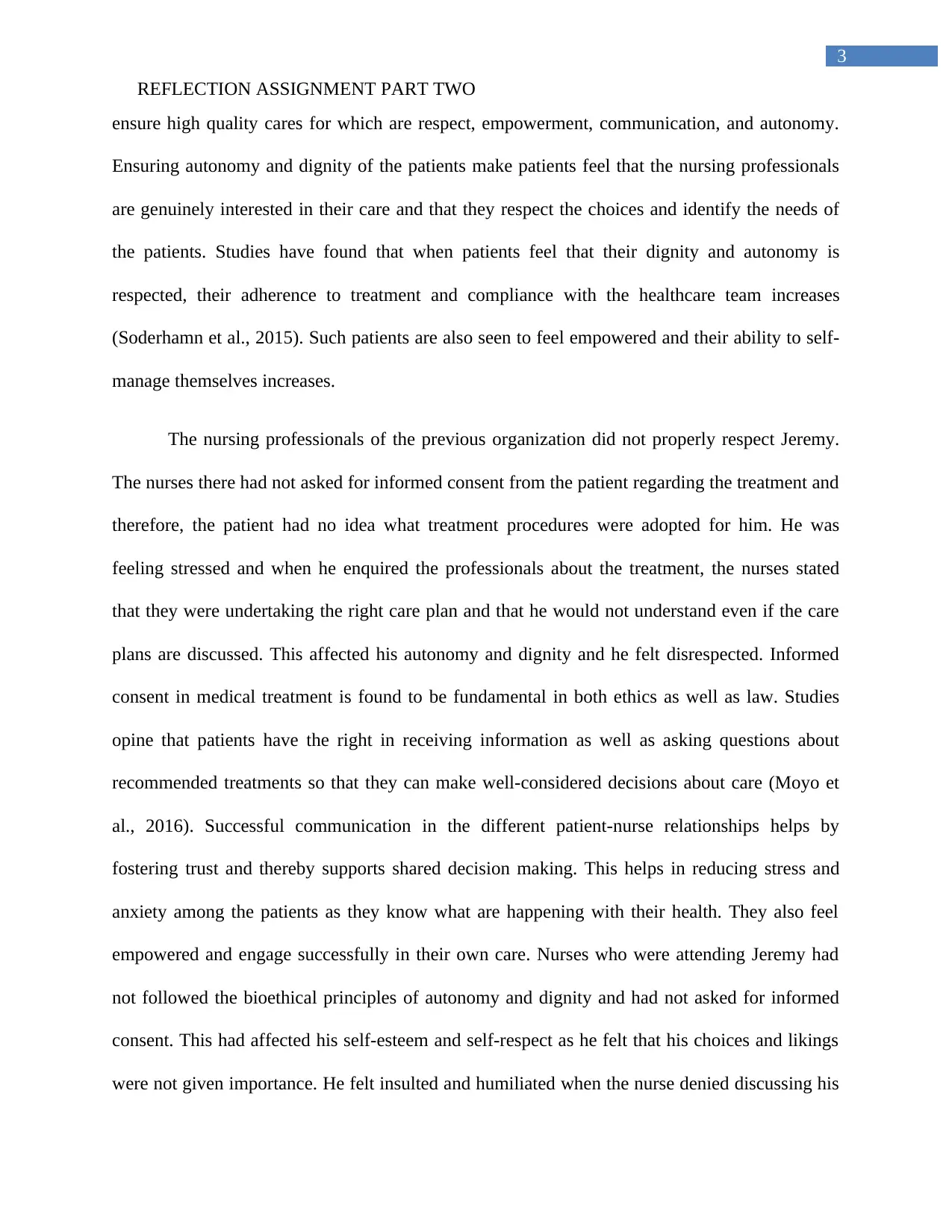
3
REFLECTION ASSIGNMENT PART TWO
ensure high quality cares for which are respect, empowerment, communication, and autonomy.
Ensuring autonomy and dignity of the patients make patients feel that the nursing professionals
are genuinely interested in their care and that they respect the choices and identify the needs of
the patients. Studies have found that when patients feel that their dignity and autonomy is
respected, their adherence to treatment and compliance with the healthcare team increases
(Soderhamn et al., 2015). Such patients are also seen to feel empowered and their ability to self-
manage themselves increases.
The nursing professionals of the previous organization did not properly respect Jeremy.
The nurses there had not asked for informed consent from the patient regarding the treatment and
therefore, the patient had no idea what treatment procedures were adopted for him. He was
feeling stressed and when he enquired the professionals about the treatment, the nurses stated
that they were undertaking the right care plan and that he would not understand even if the care
plans are discussed. This affected his autonomy and dignity and he felt disrespected. Informed
consent in medical treatment is found to be fundamental in both ethics as well as law. Studies
opine that patients have the right in receiving information as well as asking questions about
recommended treatments so that they can make well-considered decisions about care (Moyo et
al., 2016). Successful communication in the different patient-nurse relationships helps by
fostering trust and thereby supports shared decision making. This helps in reducing stress and
anxiety among the patients as they know what are happening with their health. They also feel
empowered and engage successfully in their own care. Nurses who were attending Jeremy had
not followed the bioethical principles of autonomy and dignity and had not asked for informed
consent. This had affected his self-esteem and self-respect as he felt that his choices and likings
were not given importance. He felt insulted and humiliated when the nurse denied discussing his
REFLECTION ASSIGNMENT PART TWO
ensure high quality cares for which are respect, empowerment, communication, and autonomy.
Ensuring autonomy and dignity of the patients make patients feel that the nursing professionals
are genuinely interested in their care and that they respect the choices and identify the needs of
the patients. Studies have found that when patients feel that their dignity and autonomy is
respected, their adherence to treatment and compliance with the healthcare team increases
(Soderhamn et al., 2015). Such patients are also seen to feel empowered and their ability to self-
manage themselves increases.
The nursing professionals of the previous organization did not properly respect Jeremy.
The nurses there had not asked for informed consent from the patient regarding the treatment and
therefore, the patient had no idea what treatment procedures were adopted for him. He was
feeling stressed and when he enquired the professionals about the treatment, the nurses stated
that they were undertaking the right care plan and that he would not understand even if the care
plans are discussed. This affected his autonomy and dignity and he felt disrespected. Informed
consent in medical treatment is found to be fundamental in both ethics as well as law. Studies
opine that patients have the right in receiving information as well as asking questions about
recommended treatments so that they can make well-considered decisions about care (Moyo et
al., 2016). Successful communication in the different patient-nurse relationships helps by
fostering trust and thereby supports shared decision making. This helps in reducing stress and
anxiety among the patients as they know what are happening with their health. They also feel
empowered and engage successfully in their own care. Nurses who were attending Jeremy had
not followed the bioethical principles of autonomy and dignity and had not asked for informed
consent. This had affected his self-esteem and self-respect as he felt that his choices and likings
were not given importance. He felt insulted and humiliated when the nurse denied discussing his
Paraphrase This Document
Need a fresh take? Get an instant paraphrase of this document with our AI Paraphraser
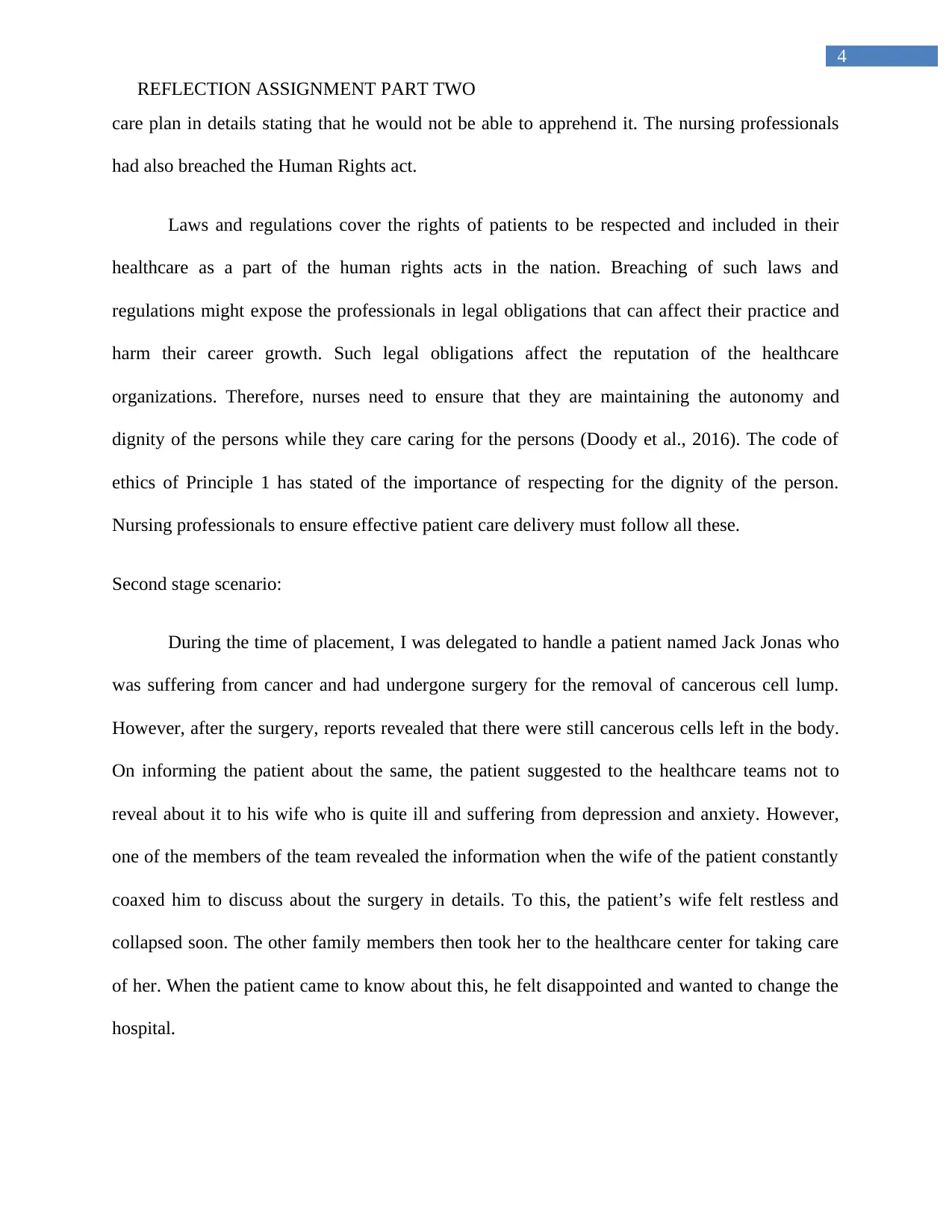
4
REFLECTION ASSIGNMENT PART TWO
care plan in details stating that he would not be able to apprehend it. The nursing professionals
had also breached the Human Rights act.
Laws and regulations cover the rights of patients to be respected and included in their
healthcare as a part of the human rights acts in the nation. Breaching of such laws and
regulations might expose the professionals in legal obligations that can affect their practice and
harm their career growth. Such legal obligations affect the reputation of the healthcare
organizations. Therefore, nurses need to ensure that they are maintaining the autonomy and
dignity of the persons while they care caring for the persons (Doody et al., 2016). The code of
ethics of Principle 1 has stated of the importance of respecting for the dignity of the person.
Nursing professionals to ensure effective patient care delivery must follow all these.
Second stage scenario:
During the time of placement, I was delegated to handle a patient named Jack Jonas who
was suffering from cancer and had undergone surgery for the removal of cancerous cell lump.
However, after the surgery, reports revealed that there were still cancerous cells left in the body.
On informing the patient about the same, the patient suggested to the healthcare teams not to
reveal about it to his wife who is quite ill and suffering from depression and anxiety. However,
one of the members of the team revealed the information when the wife of the patient constantly
coaxed him to discuss about the surgery in details. To this, the patient’s wife felt restless and
collapsed soon. The other family members then took her to the healthcare center for taking care
of her. When the patient came to know about this, he felt disappointed and wanted to change the
hospital.
REFLECTION ASSIGNMENT PART TWO
care plan in details stating that he would not be able to apprehend it. The nursing professionals
had also breached the Human Rights act.
Laws and regulations cover the rights of patients to be respected and included in their
healthcare as a part of the human rights acts in the nation. Breaching of such laws and
regulations might expose the professionals in legal obligations that can affect their practice and
harm their career growth. Such legal obligations affect the reputation of the healthcare
organizations. Therefore, nurses need to ensure that they are maintaining the autonomy and
dignity of the persons while they care caring for the persons (Doody et al., 2016). The code of
ethics of Principle 1 has stated of the importance of respecting for the dignity of the person.
Nursing professionals to ensure effective patient care delivery must follow all these.
Second stage scenario:
During the time of placement, I was delegated to handle a patient named Jack Jonas who
was suffering from cancer and had undergone surgery for the removal of cancerous cell lump.
However, after the surgery, reports revealed that there were still cancerous cells left in the body.
On informing the patient about the same, the patient suggested to the healthcare teams not to
reveal about it to his wife who is quite ill and suffering from depression and anxiety. However,
one of the members of the team revealed the information when the wife of the patient constantly
coaxed him to discuss about the surgery in details. To this, the patient’s wife felt restless and
collapsed soon. The other family members then took her to the healthcare center for taking care
of her. When the patient came to know about this, he felt disappointed and wanted to change the
hospital.
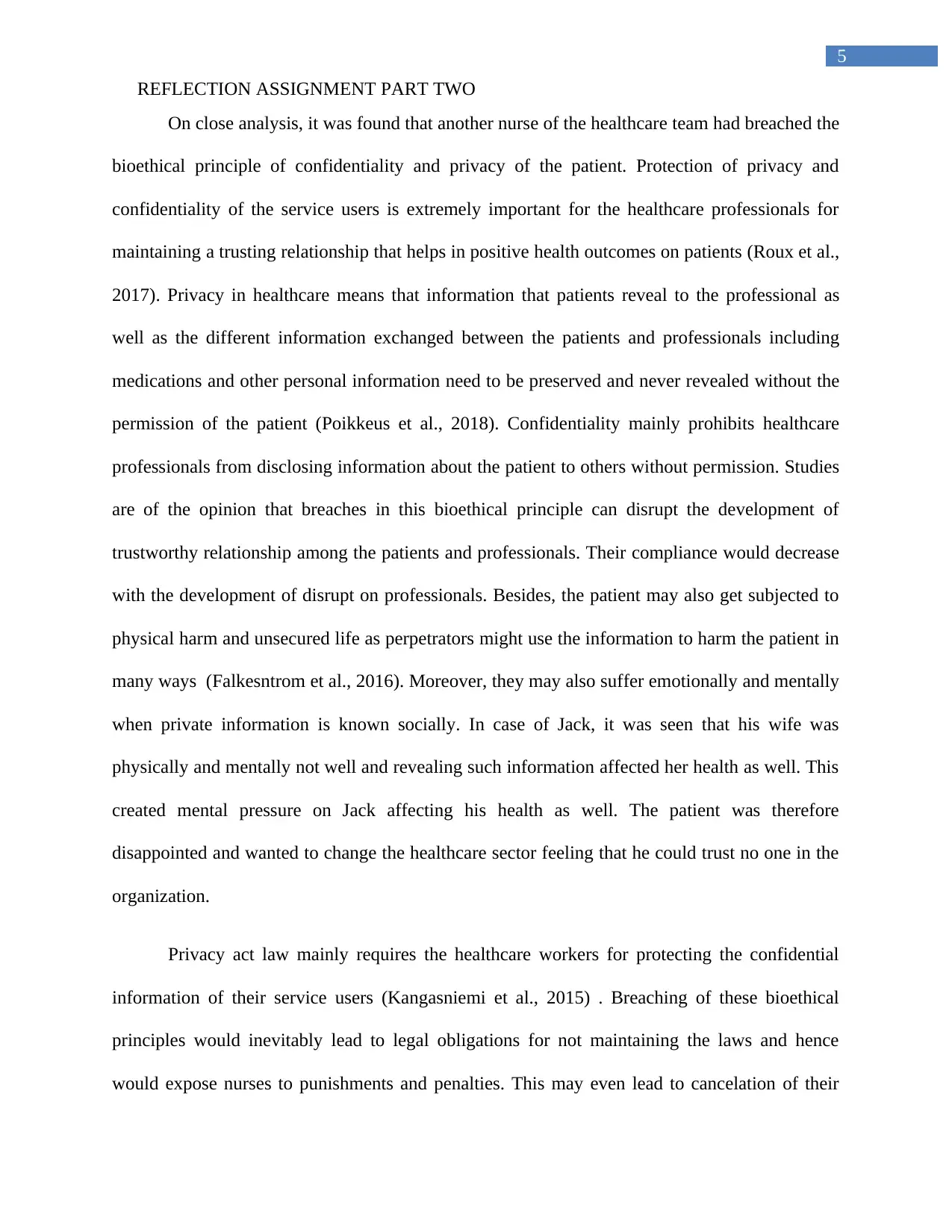
5
REFLECTION ASSIGNMENT PART TWO
On close analysis, it was found that another nurse of the healthcare team had breached the
bioethical principle of confidentiality and privacy of the patient. Protection of privacy and
confidentiality of the service users is extremely important for the healthcare professionals for
maintaining a trusting relationship that helps in positive health outcomes on patients (Roux et al.,
2017). Privacy in healthcare means that information that patients reveal to the professional as
well as the different information exchanged between the patients and professionals including
medications and other personal information need to be preserved and never revealed without the
permission of the patient (Poikkeus et al., 2018). Confidentiality mainly prohibits healthcare
professionals from disclosing information about the patient to others without permission. Studies
are of the opinion that breaches in this bioethical principle can disrupt the development of
trustworthy relationship among the patients and professionals. Their compliance would decrease
with the development of disrupt on professionals. Besides, the patient may also get subjected to
physical harm and unsecured life as perpetrators might use the information to harm the patient in
many ways (Falkesntrom et al., 2016). Moreover, they may also suffer emotionally and mentally
when private information is known socially. In case of Jack, it was seen that his wife was
physically and mentally not well and revealing such information affected her health as well. This
created mental pressure on Jack affecting his health as well. The patient was therefore
disappointed and wanted to change the healthcare sector feeling that he could trust no one in the
organization.
Privacy act law mainly requires the healthcare workers for protecting the confidential
information of their service users (Kangasniemi et al., 2015) . Breaching of these bioethical
principles would inevitably lead to legal obligations for not maintaining the laws and hence
would expose nurses to punishments and penalties. This may even lead to cancelation of their
REFLECTION ASSIGNMENT PART TWO
On close analysis, it was found that another nurse of the healthcare team had breached the
bioethical principle of confidentiality and privacy of the patient. Protection of privacy and
confidentiality of the service users is extremely important for the healthcare professionals for
maintaining a trusting relationship that helps in positive health outcomes on patients (Roux et al.,
2017). Privacy in healthcare means that information that patients reveal to the professional as
well as the different information exchanged between the patients and professionals including
medications and other personal information need to be preserved and never revealed without the
permission of the patient (Poikkeus et al., 2018). Confidentiality mainly prohibits healthcare
professionals from disclosing information about the patient to others without permission. Studies
are of the opinion that breaches in this bioethical principle can disrupt the development of
trustworthy relationship among the patients and professionals. Their compliance would decrease
with the development of disrupt on professionals. Besides, the patient may also get subjected to
physical harm and unsecured life as perpetrators might use the information to harm the patient in
many ways (Falkesntrom et al., 2016). Moreover, they may also suffer emotionally and mentally
when private information is known socially. In case of Jack, it was seen that his wife was
physically and mentally not well and revealing such information affected her health as well. This
created mental pressure on Jack affecting his health as well. The patient was therefore
disappointed and wanted to change the healthcare sector feeling that he could trust no one in the
organization.
Privacy act law mainly requires the healthcare workers for protecting the confidential
information of their service users (Kangasniemi et al., 2015) . Breaching of these bioethical
principles would inevitably lead to legal obligations for not maintaining the laws and hence
would expose nurses to punishments and penalties. This may even lead to cancelation of their
⊘ This is a preview!⊘
Do you want full access?
Subscribe today to unlock all pages.

Trusted by 1+ million students worldwide
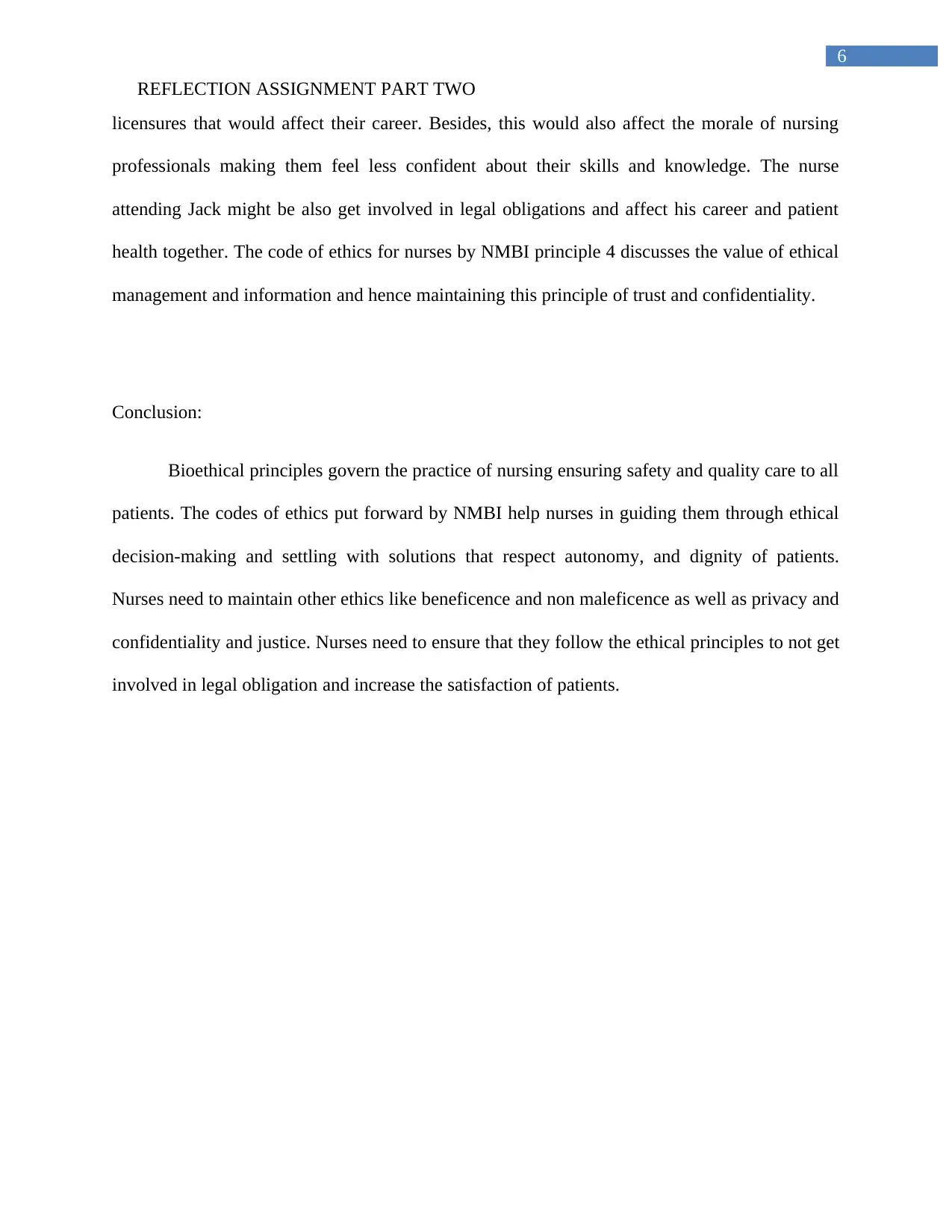
6
REFLECTION ASSIGNMENT PART TWO
licensures that would affect their career. Besides, this would also affect the morale of nursing
professionals making them feel less confident about their skills and knowledge. The nurse
attending Jack might be also get involved in legal obligations and affect his career and patient
health together. The code of ethics for nurses by NMBI principle 4 discusses the value of ethical
management and information and hence maintaining this principle of trust and confidentiality.
Conclusion:
Bioethical principles govern the practice of nursing ensuring safety and quality care to all
patients. The codes of ethics put forward by NMBI help nurses in guiding them through ethical
decision-making and settling with solutions that respect autonomy, and dignity of patients.
Nurses need to maintain other ethics like beneficence and non maleficence as well as privacy and
confidentiality and justice. Nurses need to ensure that they follow the ethical principles to not get
involved in legal obligation and increase the satisfaction of patients.
REFLECTION ASSIGNMENT PART TWO
licensures that would affect their career. Besides, this would also affect the morale of nursing
professionals making them feel less confident about their skills and knowledge. The nurse
attending Jack might be also get involved in legal obligations and affect his career and patient
health together. The code of ethics for nurses by NMBI principle 4 discusses the value of ethical
management and information and hence maintaining this principle of trust and confidentiality.
Conclusion:
Bioethical principles govern the practice of nursing ensuring safety and quality care to all
patients. The codes of ethics put forward by NMBI help nurses in guiding them through ethical
decision-making and settling with solutions that respect autonomy, and dignity of patients.
Nurses need to maintain other ethics like beneficence and non maleficence as well as privacy and
confidentiality and justice. Nurses need to ensure that they follow the ethical principles to not get
involved in legal obligation and increase the satisfaction of patients.
Paraphrase This Document
Need a fresh take? Get an instant paraphrase of this document with our AI Paraphraser
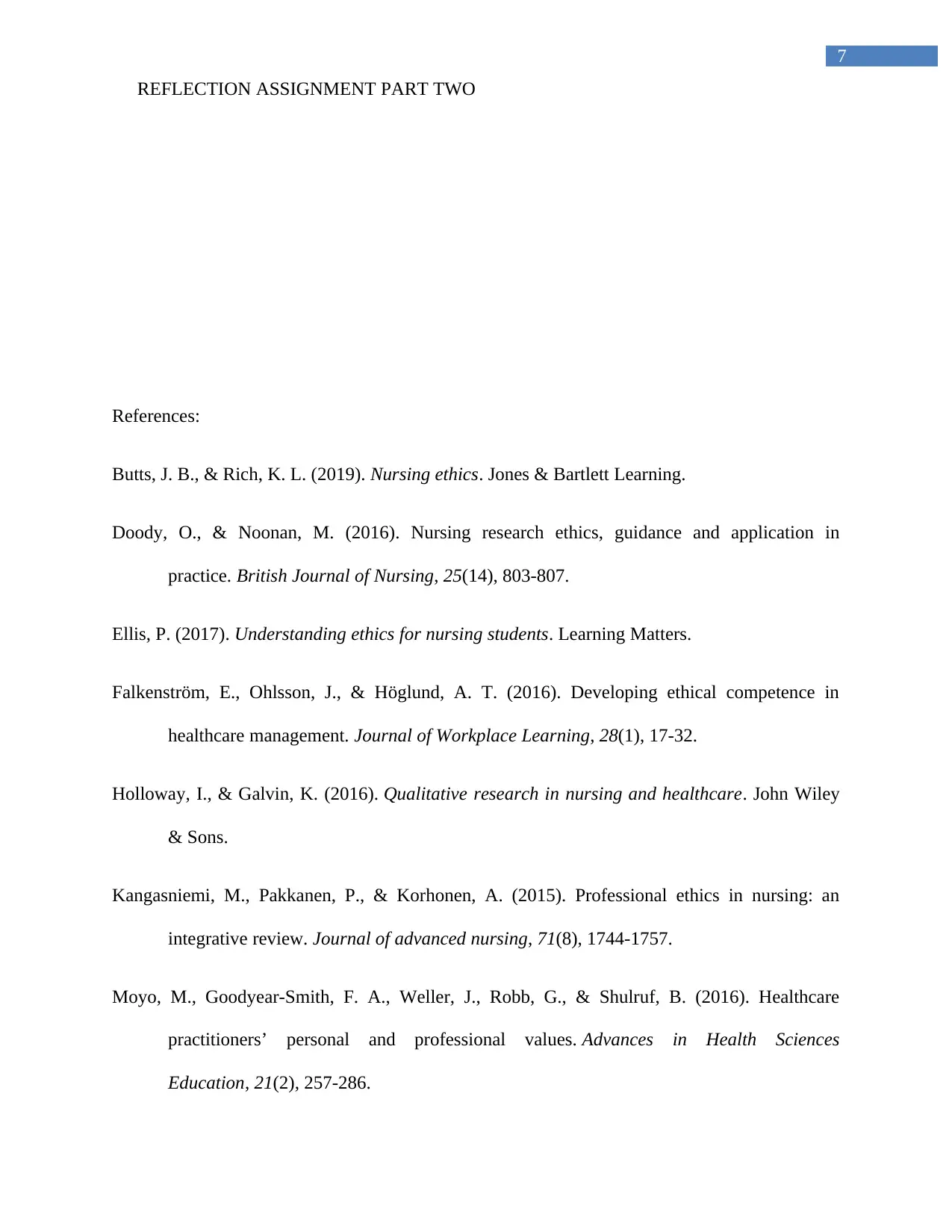
7
REFLECTION ASSIGNMENT PART TWO
References:
Butts, J. B., & Rich, K. L. (2019). Nursing ethics. Jones & Bartlett Learning.
Doody, O., & Noonan, M. (2016). Nursing research ethics, guidance and application in
practice. British Journal of Nursing, 25(14), 803-807.
Ellis, P. (2017). Understanding ethics for nursing students. Learning Matters.
Falkenström, E., Ohlsson, J., & Höglund, A. T. (2016). Developing ethical competence in
healthcare management. Journal of Workplace Learning, 28(1), 17-32.
Holloway, I., & Galvin, K. (2016). Qualitative research in nursing and healthcare. John Wiley
& Sons.
Kangasniemi, M., Pakkanen, P., & Korhonen, A. (2015). Professional ethics in nursing: an
integrative review. Journal of advanced nursing, 71(8), 1744-1757.
Moyo, M., Goodyear-Smith, F. A., Weller, J., Robb, G., & Shulruf, B. (2016). Healthcare
practitioners’ personal and professional values. Advances in Health Sciences
Education, 21(2), 257-286.
REFLECTION ASSIGNMENT PART TWO
References:
Butts, J. B., & Rich, K. L. (2019). Nursing ethics. Jones & Bartlett Learning.
Doody, O., & Noonan, M. (2016). Nursing research ethics, guidance and application in
practice. British Journal of Nursing, 25(14), 803-807.
Ellis, P. (2017). Understanding ethics for nursing students. Learning Matters.
Falkenström, E., Ohlsson, J., & Höglund, A. T. (2016). Developing ethical competence in
healthcare management. Journal of Workplace Learning, 28(1), 17-32.
Holloway, I., & Galvin, K. (2016). Qualitative research in nursing and healthcare. John Wiley
& Sons.
Kangasniemi, M., Pakkanen, P., & Korhonen, A. (2015). Professional ethics in nursing: an
integrative review. Journal of advanced nursing, 71(8), 1744-1757.
Moyo, M., Goodyear-Smith, F. A., Weller, J., Robb, G., & Shulruf, B. (2016). Healthcare
practitioners’ personal and professional values. Advances in Health Sciences
Education, 21(2), 257-286.
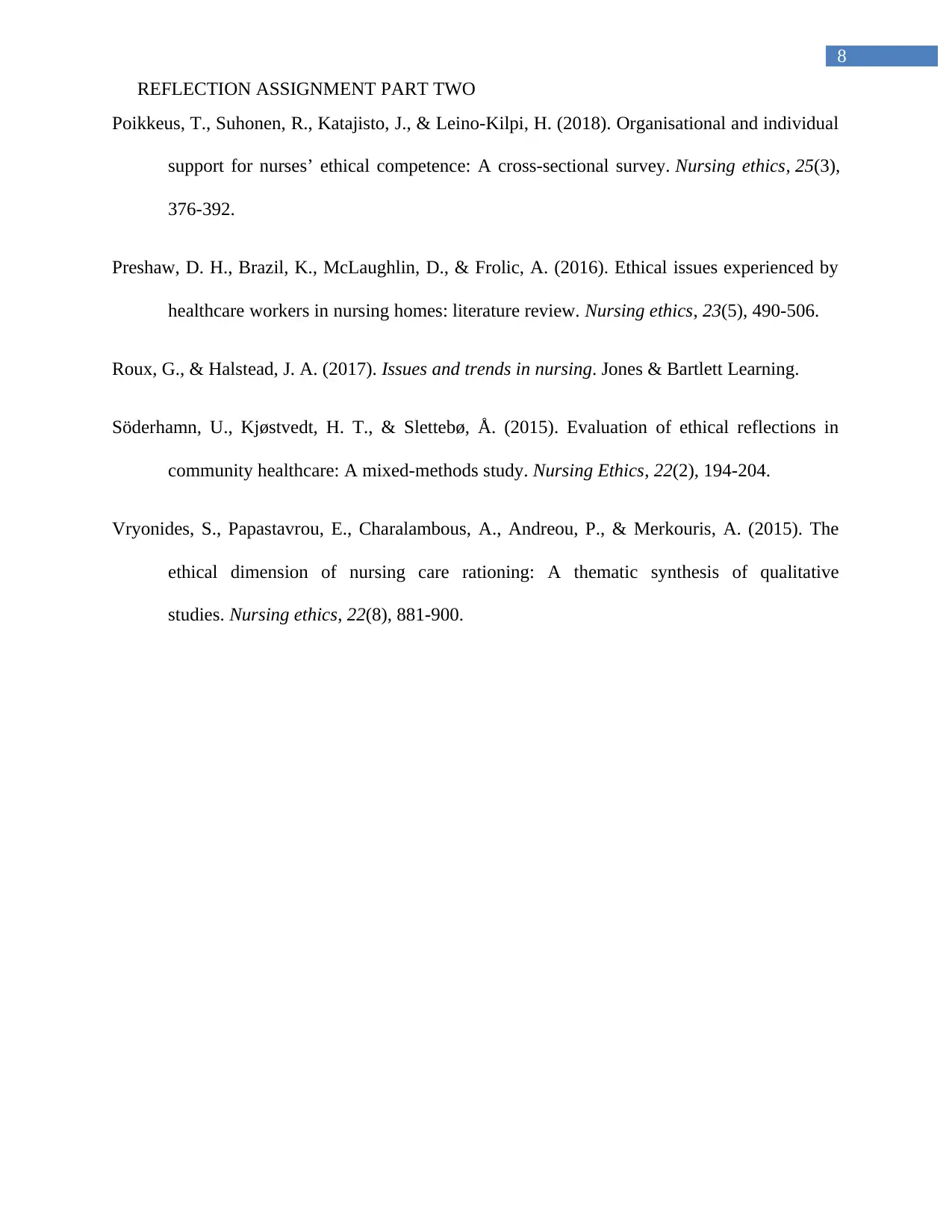
8
REFLECTION ASSIGNMENT PART TWO
Poikkeus, T., Suhonen, R., Katajisto, J., & Leino-Kilpi, H. (2018). Organisational and individual
support for nurses’ ethical competence: A cross-sectional survey. Nursing ethics, 25(3),
376-392.
Preshaw, D. H., Brazil, K., McLaughlin, D., & Frolic, A. (2016). Ethical issues experienced by
healthcare workers in nursing homes: literature review. Nursing ethics, 23(5), 490-506.
Roux, G., & Halstead, J. A. (2017). Issues and trends in nursing. Jones & Bartlett Learning.
Söderhamn, U., Kjøstvedt, H. T., & Slettebø, Å. (2015). Evaluation of ethical reflections in
community healthcare: A mixed-methods study. Nursing Ethics, 22(2), 194-204.
Vryonides, S., Papastavrou, E., Charalambous, A., Andreou, P., & Merkouris, A. (2015). The
ethical dimension of nursing care rationing: A thematic synthesis of qualitative
studies. Nursing ethics, 22(8), 881-900.
REFLECTION ASSIGNMENT PART TWO
Poikkeus, T., Suhonen, R., Katajisto, J., & Leino-Kilpi, H. (2018). Organisational and individual
support for nurses’ ethical competence: A cross-sectional survey. Nursing ethics, 25(3),
376-392.
Preshaw, D. H., Brazil, K., McLaughlin, D., & Frolic, A. (2016). Ethical issues experienced by
healthcare workers in nursing homes: literature review. Nursing ethics, 23(5), 490-506.
Roux, G., & Halstead, J. A. (2017). Issues and trends in nursing. Jones & Bartlett Learning.
Söderhamn, U., Kjøstvedt, H. T., & Slettebø, Å. (2015). Evaluation of ethical reflections in
community healthcare: A mixed-methods study. Nursing Ethics, 22(2), 194-204.
Vryonides, S., Papastavrou, E., Charalambous, A., Andreou, P., & Merkouris, A. (2015). The
ethical dimension of nursing care rationing: A thematic synthesis of qualitative
studies. Nursing ethics, 22(8), 881-900.
⊘ This is a preview!⊘
Do you want full access?
Subscribe today to unlock all pages.

Trusted by 1+ million students worldwide
1 out of 9
Related Documents
Your All-in-One AI-Powered Toolkit for Academic Success.
+13062052269
info@desklib.com
Available 24*7 on WhatsApp / Email
![[object Object]](/_next/static/media/star-bottom.7253800d.svg)
Unlock your academic potential
Copyright © 2020–2026 A2Z Services. All Rights Reserved. Developed and managed by ZUCOL.





